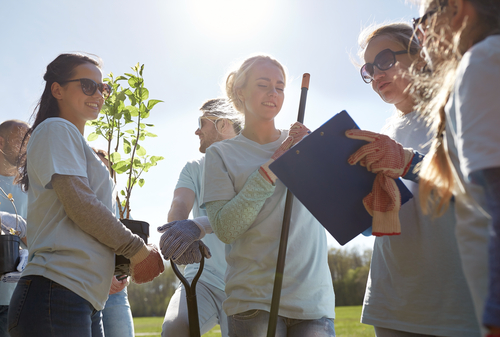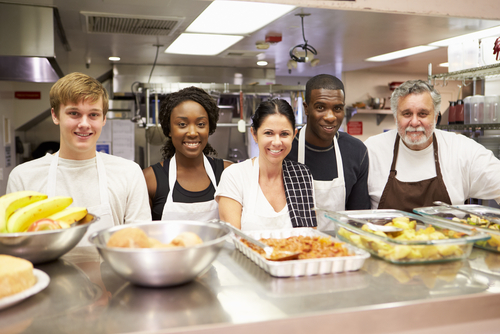- Search Please fill out this field.
- Career Planning
- Finding a Job

Top Post Graduate Volunteer Opportunities
Why volunteer, peace corps, the student conservation association, the catholic volunteer network, match corps, teach for america, frequently asked questions (faqs).
Marko Geber / Getty Images
Prior to embarking upon their career journey, many college graduates decide to take a gap year to serve others, enhance personal growth, and/or explore different cultures and geographic locations.
Key Takeaways
- Volunteering could help you give back to the community while helping you as well
- Volunteering could enhance personal growth, and/or explore different cultures and geographic locations.
- Volunteering could also help develop skills such as leadership and teamwork that could come in handy for your career
- Some volunteer opportunities may offer benefits such as a stipend, health insurance and student loan benefits.
Volunteer service doesn't just help you give back to the community and become a part of something bigger, it can also help graduate students develop skills and contacts that can serve them well in their ultimate career. You can gain exposure to a specific subject area while also practicing skills such as leadership, teamwork, and critical thinking.
Volunteer opportunities come in many forms with key differences in costs and benefits.
AmeriCorps is a huge umbrella organization encompasses scores of agencies and thousands of opportunities. Volunteers work in a broad spectrum of public service sectors including community development, children and youth, education, environment, health, homelessness, housing, hunger, and eldercare. There is no fee for participating in these programs.
AmeriCorps volunteers receive a stipend to cover living expenses, health coverage, and an education award at the end of service, which can help repay loans or fund future studies. They may be able to defer student loan payments as well.
The Peace Corps is a branch of the U.S government which engages volunteers in international service projects. Volunteers work in areas like agriculture, health, youth and community development, education, HIV/AIDS, the environment, and food security. Participants perform service in Asia, Central and South America, Africa, Eastern Europe, the Middle East, Mexico, and the Pacific Islands.
Peace Corps volunteers must commit to 27 months of service, though they receive two days of vacation per month of service and many participants return home or travel internationally during their term of service.
There are no fees to participate and volunteers receive a living allowance, medical/dental coverage, travel to and from their volunteer site, deferment/cancellation of some loans, and a transition award of more than $10,000 after completing their service.
City Year operates educational support programs in over 29 cities nationwide. Corp members sign on for 11 months during which they provide one-on-one or small group tutoring before, during, and after school to children in third through ninth grade. Volunteers also lead and organize after-school activities, celebrations, and projects to improve the community and school environment.
There are no fees to participate. Volunteers receive a stipend to help cover living expenses and an education award of nearly $5,000 at the end of their experience to repay loans or fund future educational endeavors. Health insurance, federal loan deferment, and childcare coverage are also provided.
The Student Conservation Association through its internship program and Conservation Corps engages volunteers for three to ten months in hands-on conservation projects in all 50 states. Corps members work on critical environmental issues such as wildfire management and education, trail restoration and maintenance, environmental education, and invasive species eradication. Volunteers receive a stipend, education award, housing (in most cases), and medical coverage for longer-term assignments.
The Catholic Volunteer Network is a non-profit clearinghouse for domestic and a few international Catholic volunteer organizations. Many placements provide a stipend, housing, and health coverage. The search page enables users to identify programs by service focus, geographic area, and factors like whether housing, stipends, and health coverage are provided.
Match Corps is a full-time residential fellows program affiliated with AmeriCorps in which participants tutor elementary, middle, or high school students at public charter schools in the Boston area. Volunteers conduct one-on-one and small group tutoring, supervise extracurricular activities, coach sports, and serve as teaching assistants to outstanding classroom teachers. Most of the students are a high need, low-income youth who otherwise would likely not go to college. Match Corps fellows receive housing and $27,000 in living allowance.
EarthCorps, also affiliated with AmeriCorps, enlists members to complete environmental restoration projects in the Puget Sound area of Washington State. Projects can include stream and salmon habitat restoration, erosion control, invasive plant removal, native plant installation, trail construction and maintenance, and volunteer management. Volunteers receive a modest stipend.
Teach for America recruits college graduates who have not completed teacher-training programs to teach in under-resourced schools with significant populations of socio-economically disadvantaged students. Participants take part in an intensive summer institute to learn teaching methodology and engage in ongoing training as they complete a two-year teaching assignment. Recruits receive compensation and benefits consistent with teachers in their district . For example, a teacher in New York can earn $46,000-$70,000 depending on their teaching assignment and prior experience.
How do you find volunteer opportunities?
You could look for volunteer opportunities by researching organizations that work in the areas that you're passionate about. You could also consider looking for volunteer opportunities through your school, through job-search websites or even the Idealist Database.
What questions to ask about volunteer opportunities?
While you should do your research before you apply for a volunteer position, its always a good idea to ask questions and clarify what the organization actually does and what you will be doing. You could also find out about any travel or benefits that come with the job.
AmeriCorps. " Find Your Best Fit ."
AmeriCorps. " VISTA Benefits ."
Peace Corps. " What Volunteers Do ."
Peace Corps. " Can Peace Corps Volunteers travel during service? "
Peace Corps. " Volunteering and Retirement ."
Peace Corps. " Benefits ."
City Year. " About ."
City Year. " Frequently Asked Questions ."
City Year. " Compensation. "
Student Conservation Association. " About US ."
Student Conservation Association. " What We Do ."
Student Conservation Association. " Are SCA internships paid? "
Catholic Volunteer Network. " The Benefits of Faith-Based Service ."
Match Corps. " Match Corps ."
EarthCorps. " Corps Program Frequntly Asked Questions (FAQs) "
Teach For America New York. " Cost of Living & Benefits ."
Related Articles
Find A Degree

Do Grad Schools Care About Volunteer Work or Extracurriculars?
Phd program rankings.
- Fully Funded PhDs in Education
- Doctor of Nursing Education
- Ph.D.: No Application Fees
- No-GRE Online Ph.D. in Psychology
- No-GRE Online Ph.D. Programs
- Fast Online Doctoral (Ph.D. and Ed.D.)
- The Most Affordable Online DBA
- Doctorate in Public Policy/Administration
- Doctor of ABA
- Transitional Doctor of Physical Therapy (DPT)
- Doctorate in Marketing
- ALL Ph.D. Degree Program Rankings
Career Guides
- Acupuncture and Oriental Medicine
- Aerospace Engineering
- Behavioral Health (D.B.H.)
- Chemical Engineering (PhD CE)
- Chemistry (D.Chem.)
- Clinical Nutrition (D.C.N.)
- Speech-Language Pathology (CScD)
- Criminology (D.Crim.)
- Economics (DEc)
- Health Science (D.H.S./D.H.Sci)
- Library Science (D.L.S.)
- Molecular Biology (Phd Mol Biol)
- Occupational Safety and Health (D.O.S.H.)
- Physics (Ph.D. Physics)
- ALL PhD Career Guides
Valuable Resources
- Best Laptops for Ph.D. Students
- Gift Ideas for Ph.D. Students
- Burnout & Chronic Stress
- The Key to Free Grad School
- Ph.D. Guide for International and Domestic Students
- Habits Of Highly Effective Leaders
- Online Doctorate Reputation
- Journals for Ph.D. Students
- Earning a PhD
- Write a Perfect Essay Like a PhD
- Master’s Degree As a Bridge To Ph.D.
- Self-Funding Your PhD
- Importance of Accreditation
- Online Ph.D. Support Groups
- Getting Accepted to an Online Ph.D.
- Common Fears of Ph.D. Students
- Habits of Successful People
- US Doctoral Degrees
- ALL VALUABLE RESOURCES
Frequently Asked Questions
- Why earn a Doctorate Degree?
- What are the Ph.D. Admission Requirements?
- How Much Does a Ph.D. Cost?
- How many years will it take for me to achieve my doctorate degree online?
- Do online doctorate degree programs require campus visits?
- Ph.D. vs. Doctorate
- ALL FREQUENTLY ASKED QUESTIONS
- Highest-Paying Doctoral Degrees
- Famous Ph.D. Theses In History
- Struggles Only a Ph.D. Student Would Understand
- Ph.D. Requiring Residencies
- The World’s Richest Doctors
- Academic Conferences
- Most Popular PhD Degrees
- ALL Ph.D. Highlights

Participation in volunteer work and extracurricular activity before graduate school is important for one’s engagement in and care for one’s community.
However, how important is it to a graduate school application? Could it make the difference in an already competitive academic environment in procuring the much-desired acceptance letter and even a scholarship or grant?
Check this out: Ph.D. Requirements – Frequently Asked Questions
As more and more students apply to graduate school, weighing the various components of an application becomes ever more important. This article explores the various perspectives on the importance of carving out time for extracurricular and volunteer work, which can be included in a graduate school application.
What do Extracurricular Activities and Volunteer Work Show about You?
Remember that graduate schools are always looking for students who will shine in their departments and their fields. Perhaps it sounds self-seeking, but graduate schools want new students who will make their university and department look good.
When considering the fact that professors have spent their lives studying and promoting a certain topic or field, it makes sense that they would want to mentor students who will carry their torch into the future. Their future and the future of the academic discipline depend on the stellar qualities of their potential students.
When considering which extracurricular activities and volunteer work to include on a graduate school application, first think about how it will reflect on your ability to show a graduate school that you will shine in their school and, specifically, the department you are applying for.
Corresponding Skill Set: Extracurricular activities or volunteer work which showcase one’s skill set, which corresponds with one’s potential graduate school discipline, should be emphasized on an application. It will likely be the first and most important aspect of an extracurricular activity or volunteer work that a graduate school will look for.
While still an undergraduate, looking for volunteer opportunities that will line up with your future field of study. If your interests are in research and obtaining a Ph.D. is your goal, try to find the time as an undergraduate to attend a conference or assist teachers and professors with their research.
If you would like to become a veterinarian, spend volunteer hours at local veterinarian clinics. Remember to keep in contact with any organization you volunteer as they can be used as a reference in the future.
Helping a small business owner certainly grants prospective graduate school students skills in business. However, thinking outside the box regarding corresponding skill sets can help determine the value level of including one’s volunteer or extracurricular activities in a graduate application.
For example, helping a small business owner not only grants the volunteer valuable experience in learning about small business operations but also assists them in acquiring skills in communication and planning, which can be emphasized when applying for a graduate degree in communications or even becoming a planning engineer.

Leadership Skills: Another of the top aspects that will be considered among applicants’ extracurricular or volunteer experience by a graduate school is that the opportunity shows that the student developed their leadership skills. Being a leader is not an easy or commonly developed skill, and admissions officers and professors know this.
If one’s extracurricular activities, such as playing an instrument, competing in a sport, or enjoying literature, include organizing a string quartet, becoming a team captain, or leading a book club, then the activities are more likely to be important in a grad school application since they demonstrate one’s ability to work as a leader.
Volunteer work picking up garbage may be considered favorable as it shows a concern for one’s environment and community health that is admirable. However, leading a town or community initiative, Anne of Green Gable’s style, toward a cleaner environment will be viewed with a higher estimation.
“Holistic” Qualities: Another quality that extracurricular activities and volunteer work often show about an applicant is their ability to be diverse, have many interests, manage their time well, and not be “stuck” in a certain role.
A graduate application to a business school may not be greatly enhanced by adding intricate details of one’s music and sports career. However, if the application is already strong and impressive from a business perspective, short sentences including one’s music awards and sports achievements can enhance opinions of an applicant’s ability to juggle multiple responsibilities.
Being a well-rounded person also shows a school that one is able to “translate” what one learns into real-world language and communicate well with those outside of the academic world. The ability to relate well with others is a valuable asset in business, academics, law, music, and virtually any graduate school studies and higher learning career.
Communication Skills: The development of communication skills are considered fairly high as well by many graduate school departments and deserves its own weighted category. If participation in a college debate club or volunteer work for an organization in which one’s communication skills were enhanced and developed were part of one’s college activities, they could have some weight on a graduate school application.

Communication skills are highly valued in any graduate department. However, remember that participating in a debate club will not be considered as much as being president of a debate club or having a leadership role in a communication-oriented club or program.
Don’t forget to include volunteer work or extracurricular participation, which includes all types of communication skills. Although most people think of communication as being primarily verbal, volunteer work that developed one’s writing skills or online communication can also be considered highly useful in a graduate degree program and may be very helpful to include on an application to graduate school.
As the need for effective online communication expands and grows, virtual volunteer work abounds. Volunteering for organizations such as Project Gutenberg or United Nations Volunteers will help students develop valuable online communication skills and should be included on a graduate school application.
Creativity: Another useful asset in any type of graduate work is creativity. According to a recent article in Times Higher Education, the subject of creativity in higher education is receiving a mixed message. On the one hand, skills and arts which require creativity are being defunded while graduate schools, in general, are looking for their students to have developed their creative skills more and more.
In the article, professors explore the role of creativity in higher education, explaining why different forms of creativity are desirable even in the STEM disciplines. According to the article, “Creative problem solving is celebrated as one of the most desirable skills for graduates entering the workplace…”
Anything from Civil War Reenactment or Cartooning to Drama Club can show the creative side of your abilities. Creativity is more highly regarded by some graduate schools or in some departments than others. As some disciplines require more creativity, be sure to evaluate the level of creativity desired or required in your potential field as you prepare your grad school application.
What Type of Graduate Degree are you Applying for?
This leads us to evaluate the type of degree you are applying for in general in order to also evaluate the role that your volunteer work or extracurricular activities may play within your application.
The importance of adding volunteer work and extracurricular activities to one’s curriculum vitae, resume, and graduate school application can certainly depend a great deal on what field of graduate school one is applying to.
Some graduate schools rate volunteer work more highly than others, so evaluating the relative importance attached to volunteer work will also help undergraduates as well as grad school applicants to prioritize their time commitments.
It is certainly true that volunteer work and extracurricular activities usually look good on a graduate school application. However, we have explored various graduate school fields in order to see if some disciplines may appreciate volunteer work more than others. Also, certain types of extracurricular activities and volunteer work may be rated more highly by some graduate fields than others.
STEM : When applying for graduate school in any STEM discipline, extracurricular activities will not be nearly as important as being highly successful academically in the subjects of math and science. However, tutoring, mentoring, or organizing science-related activities as an undergraduate or before applying to graduate school are directly related to any STEM field and can only assist an application.
The general consensus is that volunteer work, as well as extracurricular activities, are less valuable in applying for graduate degrees in the STEM disciplines since the degrees are highly specialized in specific rather than general skill sets.
Therefore, especially with STEM graduate degree programs, knowing which field one is interested in applying to as early as possible will help one to determine which extracurricular activities will be most useful.
Conversely, when deciding which graduate field to apply to, remembering which extracurricular activities one enjoyed more can also be helpful. Engaging in volunteer opportunities that were enjoyable will also show up more convincingly on a graduate school application.
For example, if a student has already decided that he or she is excited about becoming a physician while still an undergraduate, seeking out volunteer opportunities at local hospitals would be a huge boost to a graduate school application.
And likewise, if an undergraduate is undecided between studying philosophy or medicine, some volunteer work at a local hospital, as well as preparing a philosophy paper, will give them an idea of which graduate field would be a better fit for them.
Arts and Humanities:

The Arts and Humanities include grad school studies such as Literature, Philosophy, Education, Social Work, and Artistic pursuits such as Music or Interior Design, among others.
Because the Arts and Humanities almost always require social interaction and understanding, such as in Education or History, well-rounded and broad-thinking individuals with a good deal of creativity are often sought to represent most graduate schools. Therefore extracurricular and volunteer endeavors are more highly valued in general by these graduate schools.
When a student has shifted from one topic of study to another, it is especially important to include “extracurricular” interests that may round out and demonstrate one’s particular ability and expertise.
In fact, one’s extracurricular studies in violin and as part of a college orchestra may be what propels a student into a graduate degree in music, in spite of graduating with a Bachelor’s in Interdisciplinary Studies.
Law schools often look only at LSAT scores and incoming students’ GPAs. Research skills and volunteer work directly related to the study of law should be considered and carefully included in an application for law school.
A “Helping” Profession:
When planning to apply for a graduate degree that will lead to a “helping” profession such as Nursing, Psychology, Public Health, or Criminal Justice, among many others, volunteer work opportunities are especially prevalent in the undergraduate years. They are also very important to add to a graduate school application.
Volunteering for the American Red Cross, Meals on Wheels, The YMCA, and many other organizations is relatively convenient and grants invaluable preparation for future “helping” careers.
When can Extracurricular or Volunteer Work look bad on a Resume?
There are times when an extracurricular activity should probably not be included in one’s graduate school application. Below are a few things to consider when deciding which volunteer and extracurricular activities to cut.
Activities that may Stigmatize : There are certain activities that may stigmatize one as a potential student.
For example, if you spent a lot of time skateboarding as a college student and even won various skateboarding competitions, there is a chance that some admissions officers won’t see the discipline and grit required to have developed the skill to become a great skater. Rather, an admissions office may envision you as a student that won’t be dedicated to the level of commitment necessary to succeed in graduate school.
Similarly, if students have spent a great deal of time on an activity that doesn’t directly relate to their graduate school interests, it may be a good idea to mention but minimalize their importance in order to create an impression of dedicated focus to a student’s field of choice.
Empty Labels: Many extracurricular activities and volunteer experiences are so commonly included and engaged in that colleges, and especially graduate schools, will not be impressed by their representation on an application. These activities may even work against you.
Placing an Internship or Research on an application without details to show concrete examples could just look like overstating one’s qualifications and experience. Some even speculate that because participation in a debate club or collegiate sport is so common, those types of activities don’t merit being included in a grad school application and can work against the applicant by making their application mundane.
Quality over Quantity

A long list of extracurricular activities on a graduate school application may not be very convincing. In fact, long lists of extracurriculars may even work against the likelihood of being accepted into a graduate school. It is generally accepted that the more work and effort a prospective student puts into extracurricular participation or volunteer event, the more they learn and produce in the effort.
Participating in collegiate sports will likely not be important enough to include on a grad school application. However, serving as captain in a collegiate sport may be worth mentioning since it shows a proclivity toward leadership and striving to be excellent. Below are some examples of what to include and not include on a grad school application.
Serving as Resident Assistant: Because working as a resident assistant in a college requires responsibility, leadership, and problem-solving, it’s an excellent leadership position to place on a grad school application. Other dorm roles that demonstrate these qualities could also be included.
Campus Ministry: Simply being a member of a campus ministry program will not draw special attention to your volunteer work. However, any leadership roles and regular and extensive ministry, such as leading music ministry events for at least a year or working in prison ministry regularly, should be included.
Attending Conferences: Attending a conference while still an undergraduate is an excellent activity to add to any graduate school application. This is especially true if the conference is in the field you are applying to.
Presenting at a conference will be very impressive to graduate schools since the skill relates directly to graduate school expectations. Attending conferences before graduate school can also be a really great way to determine a field of study if students are undecided about their field of study in higher education.
Choose what you Love: Undergraduate students looking to go into higher education should choose one or two extracurricular or volunteer opportunities that they highly enjoy and ideally fit with their future area of study. When studies and stress pile up, engaging in activities that are enjoyable will motivate them to put more energy into their extracurriculars.
Students should seek leadership positions and fulfilling roles that will assist them in gaining the most out of the time they spend volunteering or engaging in an extracurricular activity.

Volunteering as Work Experience
Presuming that work experience is important for being admitted into the graduate school of your choice, volunteering can often work as a substitute for work experience. In fact, internships are often unpaid work positions though they pay high dividends in the long term.
Enhancing a CV with a summer volunteer program can fill in for work experience, especially if the volunteer work grants the same experience that individuals would have gained had they been employed. Remember that graduate schools aren’t looking primarily to see if a student made money but rather that they gained skills to assist them in the next step of their education.
Ironically, students who acquire jobs during their undergraduate years usually have a higher GPA on average than those who don’t work. The idea may be that undergraduate students stay focused by being responsible and having to work for what they are achieving.

According to an article by Boston University, a study showed that “four-year college students working 20 hours or less had an average GPA of 3.13, versus nonworking students, who had an average GPA of 3.04. But the benefits were reversed with too much multitasking: students who worked more than 20 hours a week had an average GPA of 2.95.”
This shows that it may actually be just as beneficial to acquire a part-time job in a future field of interest as it is to volunteer. If one is planning to attend graduate school, however, volunteering may be more important if one can’t get a job that would relate to a future graduate program.
Distinguish between hard skills and soft skills as they apply differently to your graduate application. According to indeed.com , “hard skills are related to specific technical knowledge and training while soft skills are personality traits such as leadership, communication or time management.”
Both hard and soft skills attained during volunteer work should be listed as they apply to what would have been working experience. Hard skills would apply more often to STEM graduate degrees, whereas soft skills are more important for Arts and Humanities degrees.
However, any type of degree program will usually value an applicant’s volunteer work in so far as it overlaps with the kind of work experience they are expecting future students to have obtained.
Often contacting references from an organization one has volunteered for will make volunteer work look more official and reassure a graduate committee that your volunteer work is legitimate. It is recommended that volunteers maintain management-level contact in the places they have worked in order to get in touch with them to obtain a reference.
Confirming one’s volunteer work with previous management and reminding them of certain aspects of it before including their information as a reference may also be a good idea.
An online community volunteer resume sample can give one an idea of how to include volunteer information on a graduate application in place of work experience.
Balance your graduate application?
One time to consider either volunteering or adding your volunteer experience to your graduate school application is when your grades aren’t quite high enough to make your application stand out. It is certain that volunteer work or extracurricular activities will hardly ever take the place of a good GPA.
However, there are some graduate programs that will weigh work experience, internships, and volunteer opportunities as more relevant to their programs than an excellent grade point average.
According to the Princeton Review , “Certain programs might look foremost at your portfolio, recommendations, or statement of purpose to provide a sense of how you’ll fare in their program. Still, others might want to see relevant experiences, such as work or an internship, and not be particularly concerned with a GPA.”
According to the same article, students can demonstrate their skills to a given university by showing how they have mastered skills through work experience. The article says that “the network you’ll cultivate in that pursuit is also likely to help you establish yourself in the field – during graduate school and beyond.”
Connect the Dots Yourself!
With hundreds of graduate applications to review, an extracurricular activity here and there will have little to no impact on the gatekeepers of elusive graduate schools. They have seen most of these activities show up over and over on the myriad of applications they have reviewed.

In order to make these activities pop, briefly spell out the productive aspects of these activities as well as how they relate to your desired field of study in order to make those aspects of a graduate school application stand out.
Briefly list the character qualities you developed while working in volunteer roles. This will connect the dots for those reading your application. Also, include as an example, in an essay on qualities that would make you a good fit with your department, how and where you believe these qualities were enhanced by your volunteer work or extracurricular activities.
This may cause the reader to take a second glance at your list of volunteer and extracurricular activities and recognize their value. This may also be important if you wish to draw attention to a specific activity that relates well to your potential field of study.
Contact all graduate schools.

Be sure to contact all graduate schools that you plan to apply to. Ask clearly what they expect from your graduate school application in general.
Also, in conversations with admissions advisors, representatives, and professors, ask how important volunteer work and extracurricular activities are when weighing incoming applications.
Keep in mind that professors and admissions boards may view these activities differently. When entering graduate school, the opinion of the professors that you may be working with can be just as important or more important than the opinion of an admissions board. So, acquire the perspective of as many members of a graduate school as possible.
Before you go, check this out:
- Ph.D. Thesis – What is it?
- For candidates
- For employers
- For members
- English (EN)
- Nederlands (NL)
Why you should do volunteering during your PhD
Is volunteering a new challenge for you, an opportunity to develop your skills, or a means of getting to know a new culture? No matter what it is, volunteering is a great way to achieve many goals. I have been volunteering for several years, and as a PhD student, I have seen the many benefits that come with it. Here are some reasons why I believe volunteering is beneficial during the PhD process.
1. MASTER YOUR SKILLS BEYOND ACADEMIA
As a PhD student, mastering skills outside of academia is essential for success. Volunteering provides an ideal platform to hone these skills. For example, volunteering will allow you to improve your public speaking and language skills, which are crucial in both academic and non-academic settings. You'll also have the opportunity to improve your leadership, communication, and problem-solving skills, which are essential for managing the complexities of a PhD. Teamwork and time management skills can be seamlessly transferred to PhD tasks, boosting confidence along the way. In addition, volunteering allows you to gain skills that may be directly relevant to your PhD, such as technology skills, social media skills, and project management. Thus, you should take the opportunity to develop both personally and professionally through volunteering.
2. GAIN PRACTICAL INSIGHTS
Volunteering in connection with your PhD topic is a valuable way to gain practical insights and knowledge. Let's say you're pursuing a PhD in the field of climate change. By volunteering on various climate change projects, including ecosystem restoration, you could gain practical experience in this field. You might use this opportunity to discover your passion for educating others about climate change or gain insight into policy-making processes. This experience might steer your career path toward science or even a government role focused on climate change. Harnessing the power of volunteering might even lead to unexpected changes in your academic trajectory during your PhD studies.
3. IMPROVE YOUR WELLBEING
The path to complete the PhD might be long and sometimes even exhausting. However, volunteering can help by creating the mental space needed to return refreshed and engaged to ensure success in your studies. It is instrumental in maintaining psychological wellbeing throughout the PhD and enhancing the overall enjoyment of the journey. For example, I spend a few hours a week tutoring students in their second language acquisitions. This activity allows me to switch off from the academic routine, recharge my mental batteries, and gain a new perspective.
4. BUILD YOUR NETWORK
Volunteering offers the opportunity to make new contacts and create valuable networks. As a PhD student, you can expand your social circles beyond the usual by interacting with other volunteers and staff in your volunteer placements, as well as interacting with the wider community. Building these connections is crucial during the PhD and benefits both your professional careers and your social contacts. And who knows? The people you meet while volunteering could one day serve as valuable references for your applications.
5. PROVE YOUR CV
While PhD students have a variety of skills, such as problem-solving, effective communication, and the ability to work with diverse groups, it might be difficult to showcase these skills on a CV. However, volunteering might be an effective way to demonstrate your skills in these areas. Volunteering not only showcases your diverse skills, but also highlights your ability to work effectively with people from different backgrounds. For example, I have volunteered at a non-profit educational institute where I was responsible for workshop management. By coordinating volunteers and managing workshop logistics, I was able to demonstrate my leadership and problem-solving skills on my CV.
6. LEAVE YOUR COMFORT ZONE
Volunteering challenges you! However, overcoming this challenge gives you the opportunity to tackle problems in your PhD project. Volunteering takes you out of your comfort zone and gives you the opportunity to meet new challenges, people with different lifestyles, and organizations with different perspectives and experiences. By finding a balance between learning something new and using your existing skills, you might use your skills to contribute to the community while developing yourself. This, in turn, will boost your confidence, stability, and the flexibility that new challenges and experiences bring both in and beyond academia.
Recent blog posts
6 cutting-edge tools and methods for phd researchers - part 2, ideas for valorization of your research, 6 cutting-edge tools and methods for phd researchers - part 1, modernizing our teaching tools, external phd: follow your drive, modernizing education, how to start volunteering during your phd, how to discuss ai tools with students and researchers, opportunities and challenges with chatgpt in education, opportunities and challenges with chatgpt in research.
On and Off Campus Volunteer Opportunities
Search Grad Grow
Volunteering can make a big impact on Stanford and the local community. If you are looking to make positive change around Stanford and in the Bay Area, check out this website, compiled by Cardinal at Work. This resource provides a list of volunteer opportunities both on and off campus. Whether your interests lie with helping others in need, supporting the arts, or improving the environment, this website can help you find a way to give back.
View Website
Grad Grow Competencies

IMAGES
COMMENTS
When applying for open opportunities, please complete and submit: 1) Interns and Volunteer Application 2) cover letter and 3) resume to [email protected]. Incomplete files will not be processed. Volunteer opportunities. Better Health Pharmacy is seeking volunteers: More information on volunteering for Better Health Pharmacy; Nursing internships
Aug 18, 2022 · Volunteering could enhance personal growth, and/or explore different cultures and geographic locations. Volunteering could also help develop skills such as leadership and teamwork that could come in handy for your career; Some volunteer opportunities may offer benefits such as a stipend, health insurance and student loan benefits.
As more and more students apply to graduate school, weighing the various components of an application becomes ever more important. This article explores the various perspectives on the importance of carving out time for extracurricular and volunteer work, which can be included in a graduate school application.
The amount of time you can dedicate to volunteering will depend on several factors, such as the intensity of your PhD program, the stage of your studies, and the demands of your research project. To manage this effectively, create a schedule that balances your PhD tasks with the time you plan to devote to volunteering.
While PhD students have a variety of skills, such as problem-solving, effective communication, and the ability to work with diverse groups, it might be difficult to showcase these skills on a CV. However, volunteering might be an effective way to demonstrate your skills in these areas.
Volunteering can make a big impact on Stanford and the local community. If you are looking to make positive change around Stanford and in the Bay Area, check out this website, compiled by Cardinal at Work. This resource provides a list of volunteer opportunities both on and off campus.